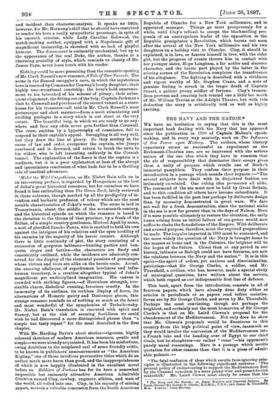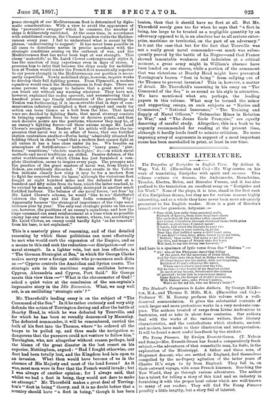THE NAVY AND THE NATION.*
WE have no hesitation in saying that this is the most important book dealing with the Navy that has appeared since the publication in 1890 of Captain Mahan's epoch- making, and in every way masterly, work on The Influence of Sea Power upon History. The authors, whose literary copartnery seems as successful an experiment as the
Erckmann-Chatrian one, are so impressed with the serious nature of the one idea which they have in common that the air of responsibility that dominates their essays gives them a unity of purpose which recalls one of Burke's immortal pamphlets. They confess their purpose in their introduction in a passage which sounds their keynote :—" The several subjects here dealt with in disjointed fashion are intimately co-related. One ruling idea permeates all alike. The command of the sea must now be held by Great Britain, and to this condition all others have become subordinate. It has been fulfilled in the past less perhaps by deliberate design than by necessity demonstrated in great wars. We dare not wait for a fresh demonstration, since the national stake in the sea is now far greater than in the days of Nelson. Even if it were possible ultimately to restore the situation, the early losses arising from an initial failure of sea-power would now suffice to shake the foundations of the Empire. With deliberate
and avowed purpose, therefore, must the required preparations be made. The impulse imparted in 1889 must be sustained, and the more widely the question of the Navy is brought home to the masses at home and in the Colonies, the brighter will be the hopes of the future. Closer than at any period in our history, intimate as Raleigh could not have foreseen, are now the relations between the Navy and the nation." It is in this spirit—the spirit of ardent, yet anxious and discriminating, patriotism—that Sir George Clarke, a soldier, and Mr. Thursfield, a civilian, who has, however, made a special study of strategical questions, have written about the service, which both regard as our indispensable first line of defence.
This book, apart from the introduction, consists in all of fourteen papers, which have already done duty either as articles in periodicals or as papers read before societies. Seven are by Sir George Clarke, and seven by Mr. Thursfield. Perhaps the most convincing, though not perhaps the brightest, and certainly not the most humorous, of Sir George Clarke's is that on Mr. Laird Clowes's proposal for the abandonment of the Mediterranean. Not only does he show that Mr. Clowes's proposals would be disastrous to this country from the high political point of view, inasmuch as they would involve the conversion of the Mediterranean into a French lake and the handing over of Egypt to our chief rivals, but he slaughters—or rather "rams "—his opponent's- purely naval reasonings. Here is a passage which merits quotation for other reasons than that it is a piesw of admir- able polemic :— "The fatal confusion of ideas which results from ignoring prin- ciples is illustrated in the following significant sentence : 'The present policy of endeavouring to support the Mediterranean fleet by the Channel squadron is a mere penny-wise and pound-foolish makeshift.' Mr. Laird Clowes must surely be aware that the • The Nary and the Nation; or, Naval Warfare and Imperial Defimee. By Lieut.-Colonel Sir George S. Clarke, K.C.M.G., F.R.S., and James B.. Thurrfield, MA. London: John Murray. peace strength of our Mediterranean fleet is determined by diplo- matic considerations. With a view to avoid the appearance of the provocative swagger' which he censures, the number of ships is deliberately restricted. At the same time, in accordance with established custom, the Channel squadron visits the Mediter- ranean every year. I fail to understand what is meant by the phrase, endeavouring to support.' It has never been possible in all eases to distribute navies in precise accordance with the strategic conditions arising on the outbreak of war, and the Mediterranean fleet has never been kept at war strength. This cheap makeshift,' as Mr. Laird Clowes contemptuously styles it, has the sanction of long experience even in days of storm. I presume him to infer that because the ships ready for mobilisa- tion at Toulon would render the French fleet numerically superior to our peace strength in the Mediterranean our position is neces- sarily imperilled. Newly mobilised ships, however, require weeks to develop their full fighting powers. From Plymouth, a modern squadron would reach the Mediterranean in four days. There are some persons who appear to believe that a great naval war can break out without any warning whatever. They have not, however, explained the modus operandi, and remembering that a hundred years ago timely information of the proceedings at Toulon was forthcoming, it is inconceivable that in days of com- munication infinitely multiplied a fleet equipped and ready for action can issue thence as a bolt from the blue. That naval wars are decided by fighting fleets, that naval strategy consists in bringing superior force to bear at decisive points, and that such decisive points are the positions, wherever they may be, of an enemy's fighting forces—all these axioms escape Mr. Laird Clowes's recognition. Readers of his article will derive the im- pression that naval war is an affair of bases, that one fortified station neutralises another—Perim being 'admirably situated for holding Obock in check '—and that a modern fleet cannot fight at all unless it has a base close under its lee. We breathe an atmosphere of fortifications= batteries," heavy guns,' 'platforms,'munitions,' electric search-lights,' &c.—in which naval
methods and naval traditions are stifled. Passive defence, of the utter worthlessness of which China has just furnished a com- plete illustration, seems to inspire every page. The precepts and the practice of the great masters of naval war, from Drake to Nelson, are ruthlessly discarded. Recent event; in the Yellow Sea indicate clearly how risky it may be for a modern fleet to fight far removed from its bases,' although the victorious fleet fought at eight hundred miles and the defeated fleet at a hundred and fifty miles from its base, which the latter reached, to be evicted by menace, and ultimately destroyed in another much fortified harbour. The balance of our naval forces, set free' by Mr. Laird Clowes's scheme, he would like to see' distributed between the Cape and the East India commands. Why ? Apparently because the strategical importance of the Cape must increase year by year.' The only real strategic points on the seas are, however, the positions of an enemy's squadrons, and how the Cape command can need reinforcement at a time when no possible enemy has any serious force in its waters, where, too, according to Mr. Laird Clowes, an enemy could hardly fight so far removed' from his base, is not explained."
This is a masterly piece of reasoning, and of that detailed reasoning by which those politicians can most effectually be met who would curb the expansion of the Empire, and as a means to this end seek the reduction—or dissipation—of our naval strength. In a lighter vein, but not less effective, is "The German Strategist at Sea," in which Sir George Clarke makes merry over a foreign critic who pronounces such dicta as :—" Cyprus controls the Anatolian and Syrian coasts. The strategic axis in this maritime region oscillates between Cyprus, Alexandria and Cyprus, Port Said." Sir George meets this view thus :—" What is the chronometer of God ? ' asked a quiet voice at the conclusion of the sea-captain's impressive story in the Idle Excursion. What, we may well
ask, is an oscillating strategic axis' ? "
Mr. Thursfield's leading essay is on the subject of "The Command of the Sea." In it he rather curiously and very ably defends the action of Torrington during and after the battle of Beachy Head, in which he was defeated by Tourville, and for which he has been so roundly denounced by Macaulay. The defeated commander, it will be remembered, carried the bulk of his fleet into the Thames, where "he ordered all the buoys to be pulled up, and thus made the navigation so dangerous that the pursuers could not venture to follow him." Torrington, who, not altogether without reason perhaps, laid the blame of the great disaster in the last resort on his superior, Nottingham, argued : "Had I fought otherwise, our fleet had been totally lost, and the Kingdom had lain open to an invasion. What then would have become of us in the absence of His Majesty and most of the land forces P As it was, most men were in fear that the French would invade ; but I was always of another opinion; for I always said, that whilst we had a fleet in being, they would not dare to make an attempt." Mr. Thursfield makes a great deal of Torring- ton's "fleet in being" theory, and it is no doubt better that a country should have "a fleet in being," though it has been
beaten, than that it should have no fleet at all. But Mr. Thursfield surely goes too far when he says that "a fleet in being, too large to be treated as a negligible quantity by an adversary opposed to it, is an absolute bar to all serious enter- prise, maritime or territorial, on the part of an adversary." Is it not the case that but for the fact that Tourville was not a really great naval commander—so much was subse- quently proved by the battle of La Hogue—and that France showed lamentable weakness and indecision at a critical moment, a great army might in William's absence have been landed on our shores, while a portion of the armament that was victorious at Beachy Head might have prevented Torrington's beaten "fleet in being" from sallying out of the Thames to prevent invasion? This is, however, a matter of detail. Mr. Thursfield's reasoning in his essay on "The Command of the Sea" is as sound as his style is attractive. We have mentioned what are, perhaps, the leading papers in this volume. What may be termed the minor and supporting essays, on such subjects as "Navies and Commerce," "National Insurance," "The Training and Supply of Naval Officers," "Submarine Mines in Relation to War," and "The Jenne Ecole Francaise," are equally deserving of careful study. Altogether, this is a book to be urgently recommended for reading at the present time, although it hardly lends itself to minute criticism. No more imposing array of arguments in support of a most important cause has been marshalled in print, at least in our time.



















































 Previous page
Previous page